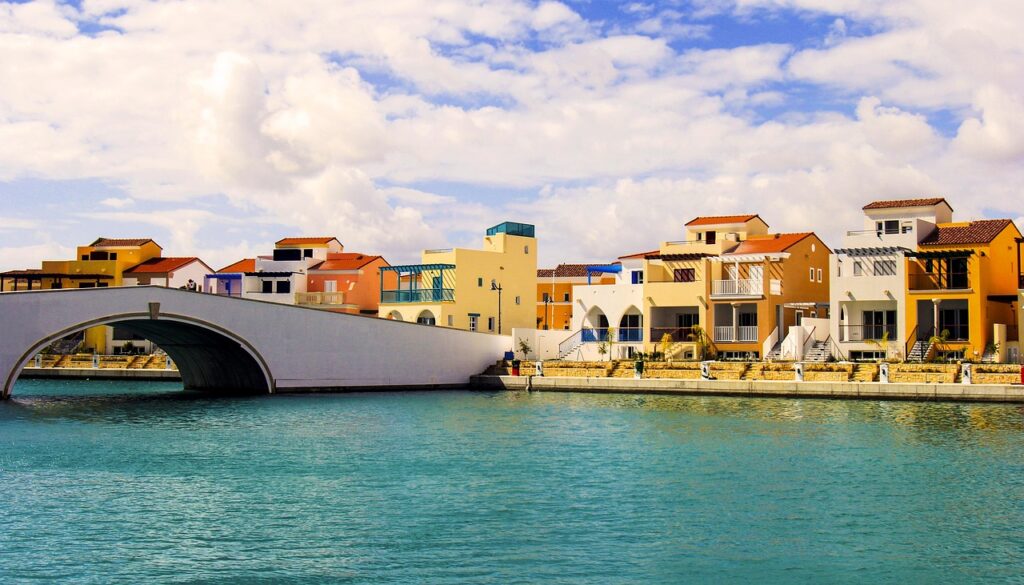How to Move to Cyprus from the UK (Post-Brexit Guide)
Dreaming of sunshine, sea views and a slower pace of life? You’re not alone. Every year, thousands explore the idea of moving abroad and for many, Cyprus comes out on top. With its warm climate, friendly locals and widespread use of English, it’s easy to see why so many are looking to move to Cyprus from the UK.
Many people from the UK find it easier to settle in Cyprus thanks to familiar touches, as they drive on the left, use the same electrical plugs and British foods are often available in supermarkets. But there’s also a vibrant Cypriot culture waiting to be explored — it’s the best of both worlds.
Since Brexit, the process of moving to an EU country has become more complex for British citizens. UK nationals are now considered “third-country” citizens in Cyprus, which means you’ll need to navigate a new set of residency rules and visa options.
But don’t worry, as there are still ways to get there!
When I was going through the process of finding out how to move to Cyprus, I was baffled by how much misinformation and conflicting advice there was, not just on social media, but even across various legal websites.
In this guide, I’ll break everything down and show you the key residency and visa options available to UK citizens.
Table of Contents
Do You Need a Visa to Move to Cyprus From the UK?
If you’re planning to move to Cyprus from the UK, your visa requirements depend on how long you intend to stay.

Short-Term Stays (Up to 90 Days)
Thanks to a visa agreement between the UK and Cyprus, British citizens can visit Cyprus for up to 90 days within any 180 day period without needing a visa. This applies to tourism, short-term visits or perhaps even a house hunting trip.
It’s the same rule that applies to most Cyprus travel visa scenarios for non-EU nationals.
You won’t need a Cyprus entry visa as a UK passport holder if your visit is under 90 days. Just ensure your passport is valid for at least three months beyond your departure date and that you have proof of return travel and accommodation, if asked.
Full entry requirements as advised by the UK government can be found here.
Will UK Travellers Need ETIAS to Visit Cyprus?
Yes, starting in late 2026, UK visitors will need an ETIAS travel authorisation to enter Cyprus for short stays (under 90 days), even though Cyprus isn’t yet part of the Schengen Area.
ETIAS is not a visa, but a quick online pre-approval, similar to the US ESTA. It will cost around €20, be valid for up to three years, and is required for travellers from visa-exempt countries like the UK.
Stay up to date with the latest ETIAS information here.
What If You Want to Stay Longer?
This is where things changed after Brexit.
UK citizens are now considered “third-country nationals” in the eyes of Cyprus immigration law. That means if you plan to live in Cyprus beyond 90 days, you’ll need to apply for a residency permit through one of several routes.
The good news? It’s totally possible.
My route to getting a residency permit was just one of a few ways. In the next section, I’ll explain the different routes you can take to live here legally.
Residency Options for UK Citizens
Once you’ve decided to move to Cyprus from the UK for longer than 90 days, you’ll need to apply for some form of residency. There are a few different paths available depending on your situation and I’ll cover some of the main ones here.
Let’s start with one of the most flexible and commonly used options:
A. Temporary Residence (Pink Slip)
The temporary residence permit is more commonly known as the Pink Slip and it is one of the most accessible ways for UK citizens to stay in Cyprus for longer than 90 days.
It’s often used by part-time residents, but for many people, it’s also the only available route, especially if you don’t meet the income or investment requirements of other permits.
Another significant benefit is that family members can apply too. Spouses and children can submit separate applications for a visitor residence permit as dependants of the main applicant, which makes it a good option for couples or families relocating together.
One important rule to be aware of is that if the permit holder leaves Cyprus for more than three continuous months, the permit is automatically cancelled. So this option is best suited for those who plan to base themselves in Cyprus, even if they travel now and then.
B. Category F Permit
The Category F residence permit is a popular option for British retirees and others who plan to live in Cyprus long-term without working. It’s designed for third-country nationals who have a secure, passive income and want to enjoy a peaceful life on the island.
To qualify for Category F, you’ll need to show:
Once approved, a Category F permit is valid indefinitely (you’re not required to renew it annually like the Pink Slip).
⚠️ Important Note: Category F Processing Delays
Although Category F is still an official route, Cyprus immigration authorities paused new application processing around 2019. As of mid-2024, they’ve started reviewing a backlog of older applications, but new applicants are likely to face long delays, potentially stretching over several years.
C. Permanent Residency – Investor Visa (Golden Visa)
For those who have the means to invest, Cyprus offers a fast-track route to permanent residency through real estate or business investment. Often referred to as the Golden Visa, this permit is officially known as Category 6.2 and is one of the most straightforward options for non-EU nationals who want to settle in Cyprus permanently.
To qualify, you’ll need to:
Unlike the Category F permit, this process is usually fast-tracked, with applications typically processed within 2–3 months.
One of the key advantages of this route is that it allows you to include your spouse and dependent children (under 25) under the same application. In some cases, even the applicant’s parents can be added if financial dependency is proven.
Most applicants use this route by purchasing new build real estate from a developer. It must be a first-time sale, not a resale property, and the buyer must provide full proof of payment. You must also visit Cyprus at least once every two years to maintain the permit.
This route isn’t for everyone, but if you were already planning to buy a home in Cyprus, it can be an efficient way to secure your long-term residency.
D. Work Visa & Employment-Based Residency
If you’re planning to move to Cyprus for a job, your route to residency will be through a work permit sponsored by your employer. This is the most common path for those in tech, finance, hospitality, education and other sectors where foreign skills are in demand.
E. Digital Nomad Visa
Cyprus has introduced a Digital Nomad Visa to attract remote workers who earn income from abroad. It’s a great option if you’re self-employed or working for a foreign company and want to base yourself in Cyprus.
While the Digital Nomad Visa is more official and defined, the Pink Slip is still widely used informally by remote workers, even though it’s technically meant for non-working residents. It’s a grey area!
Can You Work in Cyprus as a UK Citizen?
Yes, UK citizens can work in Cyprus, but you’ll need the right paperwork.
Since Brexit, UK nationals are classed as third-country citizens, which means you can no longer just arrive and start working. You’ll need a valid Cyprus work visa or residence permit that allows employment.
There are a few main routes:
Living in Cyprus as a UK National
Once you’ve sorted your residency, it’s time to settle into everyday life. Cyprus offers a comfortable blend of familiarity and Mediterranean charm that many UK residents appreciate.
Healthcare (GESY)
Cyprus has a national healthcare system called GESY, but access depends on your residency status. Some residence permits, like work-based or permanent residency, allow you to register, while others (such as the Pink Slip) do not.
Many people instead choose private health insurance, which is widely available and often more flexible for newcomers.
Cost of Living
One of the reasons many people choose to move to Cyprus is the generally lower cost of living compared to the UK.
While how much you spend will depend on your lifestyle and location, many newcomers find that expenses like rent, household bills and eating out are more affordable.
As with anywhere, it’s possible to live frugally or luxuriously in Cyprus. The good news is that most people find they can enjoy a comfortable lifestyle at a lower cost than back in the UK.
Renting or Buying a Home in Cyprus
UK citizens can buy property in Cyprus, although the process is slightly different post-Brexit and often requires special approval for non-EU buyers.
Long-term rentals are widely available in Cyprus and tend to be more flexible than what many UK citizens are used to.
If you’re still deciding where to settle or want to test out a location before buying, renting is a great way to ease into life on the island.
In most cases, the process is much simpler than in the UK. While requirements can vary by landlord or region, many rental agreements in Cyprus do not involve credit checks, guarantors, or detailed financial vetting. Typically, you’ll be expected to pay a deposit and the first month’s rent upfront, and you’re good to go.
That said, not every experience will be as straightforward and it’s wise to clarify what’s included. But overall, from experience I can say that renting in Cyprus tends to be a far less bureaucratic and stressful process than it often is in the UK.
Prices vary significantly by region, for example, Paphos and Larnaca tend to be more affordable than areas like Nicosia or Limassol.
Driving in Cyprus
You can use your UK driving licence in Cyprus for up to six months after becoming a resident. After that, you’re expected to exchange it for a Cypriot licence.
In theory, the process is straightforward.
In practice, it can be delayed by bureaucracy, especially if you’re still waiting on your biometric residence card, which is required for the exchange. The rules can also vary slightly depending on where you apply.
Many people recommend visiting a Citizen Service Centre for help, as the process isn’t always clearly explained. The good news is that you won’t need to retake your driving test, and once sorted, the Cypriot licence is valid for many years.
Bringing Pets
Bringing your pet to Cyprus is possible with the right paperwork.
Cats and dogs from the UK must meet Pet Travel Scheme rules, including microchipping, rabies vaccinations and a health certificate. Many expats bring their pets over successfully via pet relocation services or accompanied flights.
Final Thoughts
Moving to Cyprus from the UK is a big step, but armed with the right information and a bit of preparation, it’s entirely doable. Whether you’re looking for sun-soaked retirement, a remote working base, or just a slower pace of life, Cyprus offers a lot to love.
There’s no “one size fits all” residency path, and things can sometimes feel a little confusing, especially post-Brexit, but hopefully this guide has given you a clearer view of your options.
I’ve gone through the process myself, so I know how many questions can come up along the way.
If there’s something specific you’d like to know, feel free to get in touch. You’re definitely not alone on this journey!

